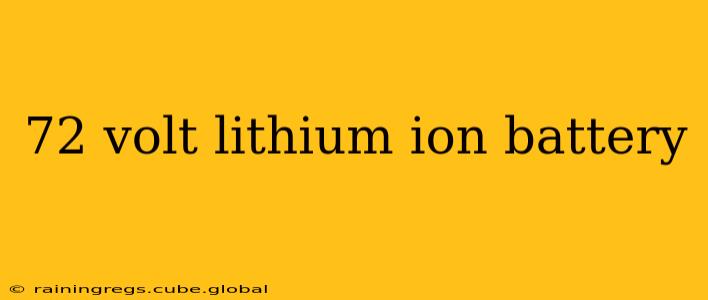72-volt lithium-ion batteries are becoming increasingly popular, powering a wide range of applications from electric vehicles (EVs) and golf carts to industrial equipment and renewable energy storage systems. Their higher voltage offers significant advantages over lower voltage systems, but understanding their nuances is crucial for selecting the right battery for your specific needs. This comprehensive guide delves into the world of 72V lithium-ion batteries, addressing common questions and providing valuable insights.
What are the advantages of a 72-volt lithium-ion battery?
The primary advantage of a 72V lithium-ion battery lies in its higher voltage. This allows for:
- Increased Power Output: Higher voltage translates to greater power delivery, enabling faster acceleration in EVs, increased torque in industrial equipment, and more efficient operation overall.
- Reduced Current Draw: For the same power output, a higher voltage system requires less current. This leads to reduced heating in the wires and components, increasing efficiency and lifespan.
- Thinner Wiring: Lower current requirements allow for the use of thinner, lighter gauge wiring, reducing weight and cost.
- Improved Efficiency: The reduced current draw and lower internal resistance in a higher voltage system contribute to higher overall efficiency.
What are 72V lithium-ion batteries used for?
72V lithium-ion batteries find applications in diverse sectors:
- Electric Vehicles (EVs): Larger EVs, such as some electric forklifts, utility vehicles, and even some light-duty trucks, often utilize 72V systems for their high power requirements.
- Golf Carts: Many high-performance golf carts employ 72V batteries for extended range and faster speeds.
- Industrial Equipment: This includes things like floor scrubbers, pallet jacks, aerial work platforms, and other heavy-duty machinery.
- Renewable Energy Storage: 72V battery banks can be used in off-grid solar power systems to provide backup power during outages or store excess energy generated during peak sunlight hours.
- Electric Motorcycles and Scooters: While less common than in other applications, some high-performance electric motorcycles and scooters may utilize 72V systems.
What is the lifespan of a 72-volt lithium-ion battery?
The lifespan of a 72V lithium-ion battery depends on several factors including:
- Battery Chemistry: Different chemistries (e.g., LiFePO4, NMC) offer varying lifespans and performance characteristics. LiFePO4 (Lithium Iron Phosphate) batteries are known for their long lifespan and safety, while NMC (Nickel Manganese Cobalt) batteries often offer higher energy density.
- Usage and Charging Practices: Deep discharging, high-temperature operation, and improper charging can significantly reduce battery lifespan. Following the manufacturer's recommendations for charging and usage is crucial.
- Environmental Conditions: Extreme temperatures (both high and low) can negatively impact battery performance and longevity.
How long does it take to charge a 72-volt lithium-ion battery?
Charging time varies greatly depending on the battery's capacity (Amp-hours or Ah) and the charger's output. Larger capacity batteries will naturally take longer to charge. A typical charging time might range from a few hours to several hours, with some fast chargers capable of significantly reducing charging times.
How much does a 72-volt lithium-ion battery cost?
The cost of a 72V lithium-ion battery is highly variable and depends on several factors, including:
- Capacity (Ah): Larger capacity batteries generally cost more.
- Battery Chemistry: Different chemistries have different price points.
- Manufacturer and Brand: Prices can vary significantly between different manufacturers.
- Features: Additional features, like built-in battery management systems (BMS), can increase the cost.
To get an accurate price, it's best to contact battery suppliers directly with your specific requirements.
How do I maintain a 72-volt lithium-ion battery?
Proper maintenance is crucial for maximizing the lifespan and performance of your 72V lithium-ion battery. Key maintenance practices include:
- Regular Inspection: Regularly inspect the battery for any signs of damage, such as swelling, leaks, or loose connections.
- Proper Charging: Always follow the manufacturer's charging instructions. Avoid overcharging or deep discharging.
- Temperature Control: Keep the battery within the recommended operating temperature range.
- Storage: When not in use, store the battery in a cool, dry place at a partially charged state.
This comprehensive guide provides a solid foundation for understanding 72-volt lithium-ion batteries. Remember to always consult the manufacturer's specifications and recommendations for your specific battery model. By understanding the nuances of these high-power energy storage solutions, you can make informed decisions and maximize their benefits for your applications.
